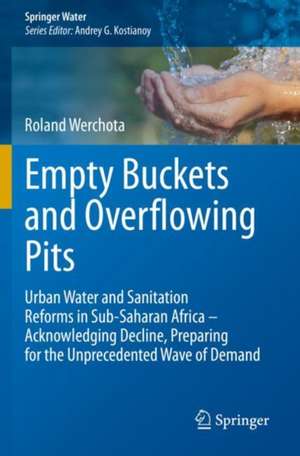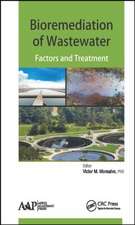Empty Buckets and Overflowing Pits: Urban Water and Sanitation Reforms in Sub-Saharan Africa – Acknowledging Decline, Preparing for the Unprecedented Wave of Demand: Springer Water
Autor Roland Werchotaen Limba Engleză Paperback – 26 aug 2021
So many efforts to reverse the negative trend in water and sanitation development have failed or targets have been repeatedly missed by far without notable consequences for decision makers on different levels and institutions. It has unnecessarily consumed many young lives, contributed to keepbillions in poverty until today and fostered discrimination of women. The knowledge gap and the confusion in the sector lined out in the book becomes evident when a national leader in a low-income country declares a state of emergency in urban water and sanitation while at the same time global monitoring publishes an access figure for urban water of over 90% for the same country. It is time to change this with an effective sector development concept for our partner countries and a more realistic discourse on global level.
The book argues for a sweeping rethinking and combines extended local knowledge, lessons learned from history in advanced countries and thorough research on reforms in Francophone and Anglophone developing countries. This was possible because the writer was working in Sub-Saharan partner countries for almost 30 years as an integrated long term advisor in different sector institutions (ministry, regulator, financing basket and different sizes of utilities) and had the opportunity to cooperate closely with the main development partners.
The reader has the opportunity to obtain a comprehensive understanding of how the sector works and sector institutions in low-income countries function and can discover the reasons behind success and failures of reforms. The book also covers issues which have a significant influence on urban water and sanitation development but are hardly the subject of discussions. It helps to make the shortcomings of the water and sanitation discourse more apparent and assist institutions to move beyond their present perceptions and agendas. All of this makes the book different from other literature about urban water and sanitation in the developing world.
| Toate formatele și edițiile | Preț | Express |
|---|---|---|
| Paperback (1) | 584.58 lei 6-8 săpt. | |
| Springer International Publishing – 26 aug 2021 | 584.58 lei 6-8 săpt. | |
| Hardback (1) | 787.78 lei 6-8 săpt. | |
| Springer International Publishing – 2 ian 2020 | 787.78 lei 6-8 săpt. |
Din seria Springer Water
- 18%
 Preț: 896.08 lei
Preț: 896.08 lei - 18%
 Preț: 956.03 lei
Preț: 956.03 lei - 24%
 Preț: 2377.17 lei
Preț: 2377.17 lei - 15%
 Preț: 653.14 lei
Preț: 653.14 lei -
 Preț: 361.55 lei
Preț: 361.55 lei - 18%
 Preț: 1877.02 lei
Preț: 1877.02 lei - 18%
 Preț: 1113.09 lei
Preț: 1113.09 lei - 18%
 Preț: 915.79 lei
Preț: 915.79 lei - 15%
 Preț: 659.70 lei
Preț: 659.70 lei - 15%
 Preț: 649.71 lei
Preț: 649.71 lei - 15%
 Preț: 648.42 lei
Preț: 648.42 lei - 15%
 Preț: 652.49 lei
Preț: 652.49 lei - 18%
 Preț: 960.78 lei
Preț: 960.78 lei - 18%
 Preț: 787.78 lei
Preț: 787.78 lei -
 Preț: 391.99 lei
Preț: 391.99 lei - 18%
 Preț: 949.55 lei
Preț: 949.55 lei - 18%
 Preț: 1005.29 lei
Preț: 1005.29 lei - 15%
 Preț: 646.75 lei
Preț: 646.75 lei - 15%
 Preț: 649.22 lei
Preț: 649.22 lei - 15%
 Preț: 648.05 lei
Preț: 648.05 lei - 18%
 Preț: 791.71 lei
Preț: 791.71 lei - 15%
 Preț: 646.43 lei
Preț: 646.43 lei - 18%
 Preț: 903.17 lei
Preț: 903.17 lei - 18%
 Preț: 1234.77 lei
Preț: 1234.77 lei - 15%
 Preț: 649.06 lei
Preț: 649.06 lei - 15%
 Preț: 661.97 lei
Preț: 661.97 lei - 18%
 Preț: 974.04 lei
Preț: 974.04 lei - 15%
 Preț: 650.86 lei
Preț: 650.86 lei - 18%
 Preț: 977.80 lei
Preț: 977.80 lei - 15%
 Preț: 665.08 lei
Preț: 665.08 lei - 18%
 Preț: 948.79 lei
Preț: 948.79 lei - 18%
 Preț: 952.72 lei
Preț: 952.72 lei - 24%
 Preț: 698.83 lei
Preț: 698.83 lei - 15%
 Preț: 647.73 lei
Preț: 647.73 lei - 15%
 Preț: 638.76 lei
Preț: 638.76 lei - 18%
 Preț: 785.42 lei
Preț: 785.42 lei - 15%
 Preț: 645.28 lei
Preț: 645.28 lei - 15%
 Preț: 640.88 lei
Preț: 640.88 lei
Preț: 584.58 lei
Preț vechi: 687.74 lei
-15% Nou
Puncte Express: 877
Preț estimativ în valută:
111.86€ • 117.10$ • 92.56£
111.86€ • 117.10$ • 92.56£
Carte tipărită la comandă
Livrare economică 05-19 aprilie
Preluare comenzi: 021 569.72.76
Specificații
ISBN-13: 9783030313852
ISBN-10: 3030313859
Pagini: 285
Ilustrații: XXII, 285 p. 24 illus., 3 illus. in color.
Dimensiuni: 155 x 235 mm
Greutate: 0.44 kg
Ediția:1st ed. 2020
Editura: Springer International Publishing
Colecția Springer
Seria Springer Water
Locul publicării:Cham, Switzerland
ISBN-10: 3030313859
Pagini: 285
Ilustrații: XXII, 285 p. 24 illus., 3 illus. in color.
Dimensiuni: 155 x 235 mm
Greutate: 0.44 kg
Ediția:1st ed. 2020
Editura: Springer International Publishing
Colecția Springer
Seria Springer Water
Locul publicării:Cham, Switzerland
Cuprins
Part 1: Urban Water and Sanitation (W+S) - Separating fiction from reality.- Chapter 1. Introduction to urban W+S in the developing world.- Chapter 2. Considerations for general W+S issues.- Chapter 3. Beyond the usual debate.- PART 2: Design and validation of the sector development model.- Chapter 4. An effective orientation and approach for development.- Chapter 5. What sector reforms in four countries teach us? .- Chapter 6. Reasons for the different reform outcomes in the four countries.- Part 3: At least full buckets and clear pits on the way forward.- Chapter 7. Ending the ‘urban W+S divide’ by serving the poor.- Chapter 8. Conclusions: The quintessence of W+S sector reforms in Sub-Saharan Africa.- Chapter 9. Recommendations: Guidance to master the coming wave of challenges.
Notă biografică
Dr Roland Werchota spent 30 years managing water sector reform support programs as long term advisor in developing countries. This involvement in the international cooperation focused on water resource management as well as urban and rural water supply and sanitation development. He is a trained civil engineer, studied economics and obtained a doctorate in the field of International Development, both at the University of Vienna. He is a co-author of numerous contributions to water and sanitation. Mr. Werchota has also worked in the construction industry for many years in large-scale water projects, e.g. in the Middle East as well as in North, South and Central Africa. A number of results obtained during reforms such as the performance level of the service provider in Burkina Faso or the regulators in Kenya and Zambia which were supported by the programs in which he was involved with can be qualified as outstanding not only in Africa but also in comparison to institutions / utilities in the industrialised world.
Textul de pe ultima copertă
This book provides a multi-level and multi-dimensional insight into urban water and sanitation development by analyzing sector reforms in Africa. With the recent events in mind - water shortages in Cape Town, widespread cholera in Haiti, mass-migration from low-income countries, etc. – it elaborates a pressing topic which is directly linked to the precarious living conditions of the urban poor in the developing countries. It is urgent to acknowledge the proposed findings and recommendations of the book which will help to improve the situation of potential refugees in their home countries with a realistic vision for the development of the most basic of all life supporting services.
So many efforts to reverse the negative trend in water and sanitation development have failed or targets have been repeatedly missed by far without notable consequences for decision makers on different levels and institutions. It has unnecessarily consumed many young lives, contributed to keepbillions in poverty until today and fostered discrimination of women. The knowledge gap and the confusion in the sector lined out in the book becomes evident when a national leader in a low-income country declares a state of emergency in urban water and sanitation while at the same time global monitoring publishes an access figure for urban water of over 90% for the same country. It is time to change this with an effective sector development concept for our partner countries and a more realistic discourse on global level.
The book argues for a sweeping rethinking and combines extended local knowledge, lessons learned from history in advanced countries and thorough research on reforms in Francophone and Anglophone developing countries. This was possible because the writer was working in Sub-Saharan partner countries for almost 30 years as an integrated long term advisor in different sector institutions (ministry, regulator, financing basket and different sizes of utilities) and had the opportunity to cooperate closely with the main development partners.
The reader has the opportunity to obtain a comprehensive understanding of how the sector works and sector institutions in low-income countries function and can discover the reasons behind success and failures of reforms. The book also covers issues which have a significant influence on urban water and sanitation development but are hardly the subject of discussions. It helps to make the shortcomings of the water and sanitation discourse more apparent and assist institutions to move beyond their present perceptions and agendas. All of this makes the book different from other literature about urban water and sanitation in the developing world.
So many efforts to reverse the negative trend in water and sanitation development have failed or targets have been repeatedly missed by far without notable consequences for decision makers on different levels and institutions. It has unnecessarily consumed many young lives, contributed to keepbillions in poverty until today and fostered discrimination of women. The knowledge gap and the confusion in the sector lined out in the book becomes evident when a national leader in a low-income country declares a state of emergency in urban water and sanitation while at the same time global monitoring publishes an access figure for urban water of over 90% for the same country. It is time to change this with an effective sector development concept for our partner countries and a more realistic discourse on global level.
The book argues for a sweeping rethinking and combines extended local knowledge, lessons learned from history in advanced countries and thorough research on reforms in Francophone and Anglophone developing countries. This was possible because the writer was working in Sub-Saharan partner countries for almost 30 years as an integrated long term advisor in different sector institutions (ministry, regulator, financing basket and different sizes of utilities) and had the opportunity to cooperate closely with the main development partners.
The reader has the opportunity to obtain a comprehensive understanding of how the sector works and sector institutions in low-income countries function and can discover the reasons behind success and failures of reforms. The book also covers issues which have a significant influence on urban water and sanitation development but are hardly the subject of discussions. It helps to make the shortcomings of the water and sanitation discourse more apparent and assist institutions to move beyond their present perceptions and agendas. All of this makes the book different from other literature about urban water and sanitation in the developing world.
Caracteristici
Compares sector reforms in low-income countries with solid data Shows the challenges which sector developments are facing from policy to implementation Explained by a practitioner who lived through all of them Specifies key elements which sector development concepts should contain Includes a sub-chapter on water poverty and water and gender in the urban setting











